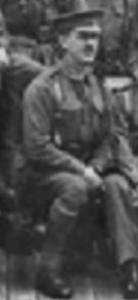As casualties lists from the Gallipoli Campaign became known in Australia from early May 1915, it became a practice to publish a photograph of individuals. These photographs were supplied by the families of the person on the casualty list. There were few photographs published in relation to the number of casualties listed. To give the extent of the human tragedy that unfolded, the photographs were extracted from the various newspapers and placed in this album. Each photograph is clearly identified to an individual and brief details are given as a short biography.
For a comprehensive listing of photographs in the album, see:
Gallipoli Album, May 1915, Contents
Finding service information.
Navigating the National Archives Service File
Should any further details be sought, see Australian Light Horse Studies Centre
Lest We Forget
Lieutenant Duncan CHAPMAN, a 26 year old Paymaster from Whytecliffe, Albion, Queensland. He enlisted with the AIF on 21 August 1914 and was allotted to the 9th Battalion, C Company which embarked from Brisbane, Queensland, on board Transport A5 Omrah on 24 September 1914. During the Great War, CHAPMAN was Killed in Action 6 August 1916, during the Pozieres, France.
Barrier Miner, Monday, 8 January 1934, p. 3.
GALLIPOLI LANDING
First Man On Shore
SYDNEY Monday.
Further interesting light is shed on the controversy, as to who was the first man ashore at Gallipoli on the memorable landing of April 26, 1915, by a letter written by the late Major D. K. Chapman (then a captain in the 9th Battalion) to his brother, Mr. Fred Chapman, of Bankstown.
Dr. C. E. W. Bean, in his supplementary, preface to the official history of the war, named Lieutenant Duncan Chapman as the first man to land. Rival claims were submitted and the question was debated through the columns of a newspaper.
In the letter written "In the Trenches, Gallipoli, July 8, 1915" Lieutenant Chapman says:
"The landing of our troops you no doubt have read about, as full accounts, have appeared in all the papers. I happened to be in the first boat that reached the shore, and being in the bow at the time, I was the first man to get ashore. I was one of the covering party who had been chosen to go ahead, and, as our boats sneaked on in the early morning light, many of us wondered who would be, the first to go."
Subsequently, Chapman went to France with tho 46th Battalion, and was a major in that unit when he was killed on August 5, 1916, at Pozieres.









